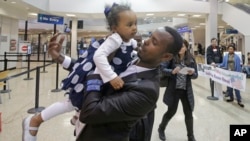The number of refugees allowed into the U.S. this fiscal year has exceeded 50,000, the cap set by President Donald Trump in his executive order restricting travelers and refugees to the U.S.
But after months of uncertainty and legal wrangling, it remains unclear how many more refugees will be allowed into the country under a recent exemption by the U.S. Supreme Court for those who have a “bona fide relationship with a person or entity in the United States.”
As of mid-day Wednesday the total number of refugees admitted was 50,086.
While the cap has been reached, the number of refugees may continue to grow. Pending its review of the travel ban later this year, the Supreme Court allowed parts of the executive order that had been suspended by judges in lower courts to go into effect; this included the temporary ban on refugees, except for those who have evidence of close family ties to the country.
Guidelines issued by the U.S. State Department and Department of Homeland Security define bona fide “close family” as a parent (including parent-in-law), spouse, child, adult son or daughter, fiancé(e), son-in-law, daughter-in-law, and sibling. The agencies will not recognize grandparents, grandchildren, aunts, uncles, and other extended” family members as close family, leading some critics of the decision to call it the “Grandma Ban.”
An acceptable relationship with an entity has to be documented, the State Department determined, and could include a job offer or enrollment in a university.
But government officials have said that relationships with the refugee agencies that agree to work with newly arrived refugees would not count as “bona fide.”
Refugees already fill out a form on family relations during the vetting process for admittance to the U.S. The new guidance requires additional documentation of the family ties and another review of a refugee’s case file by government officials, delaying the process for those individuals.
Kay Bellor, vice president of programs at Lutheran Immigration and Refugee Service, says about one third of the refugees the resettlement agency has committed to receiving by the end of September have claimed a close family tie.
“Of the 3,707 refugees that we have assured, sorting out the sons and the mothers and the husbands and the fathers, it appears we have a little over 1,200 individuals that have that bona fide relationship,” says Bellor.
That leaves thousands more refugees who have already been through the vetting process to come to the United States without a new country to call home.
“There’s still a lot of people we think should be able to come, but that at least during the pause can’t,” says Bellor.
Resettlement agencies began the fiscal year anticipating the arrival of up to 110,000 refugees, as determined by then-President Barack Obama.
The Trump administration, citing national security concerns, first issued a travel and refugee ban in January. But the White House failed to provide evidence of those concerns and has faced lawsuits across the U.S., as it has struggled to implement restrictions on those groups.
The Supreme Court is expected to hear the two travel ban-related cases when it reconvenes in October.













